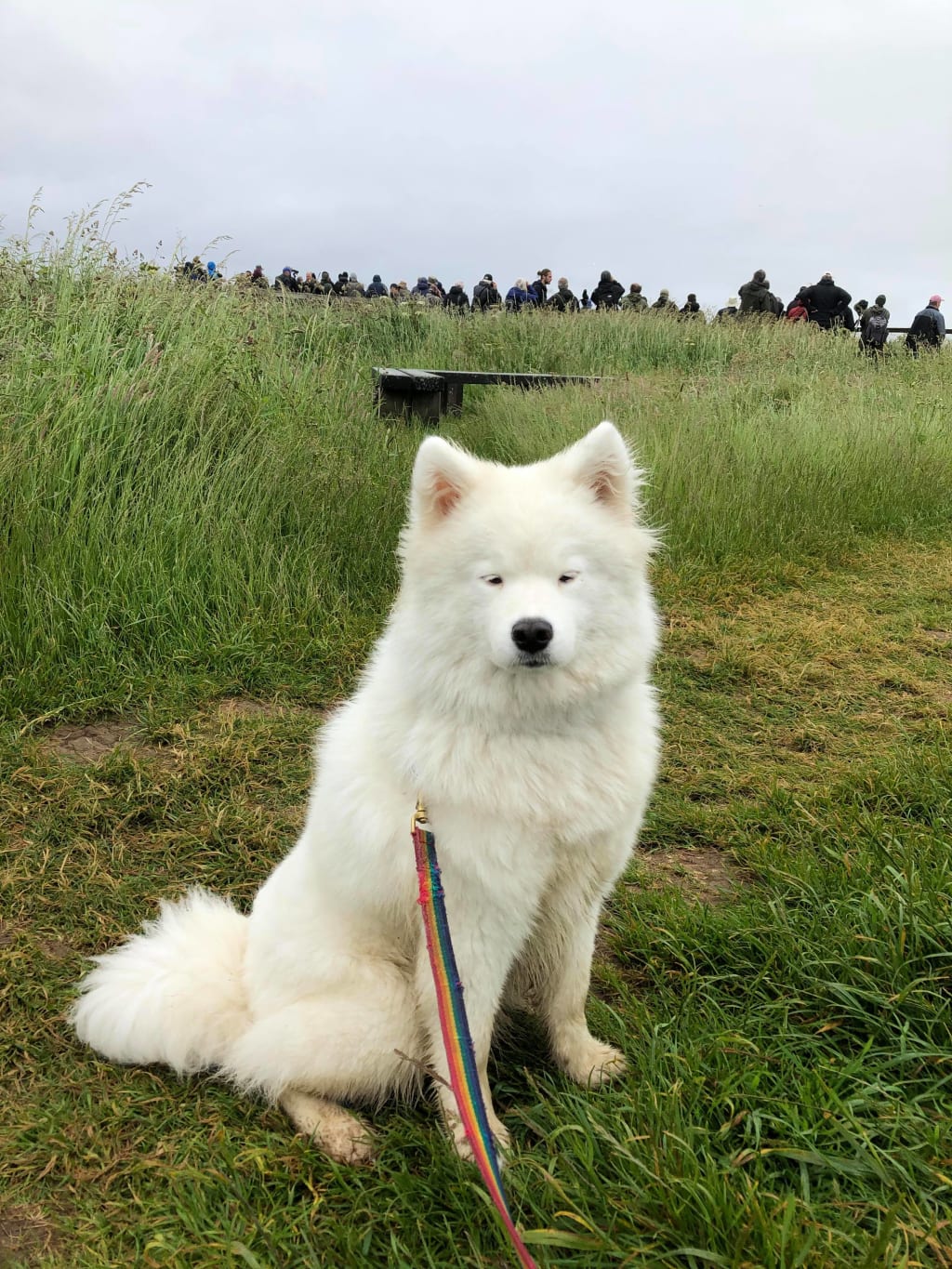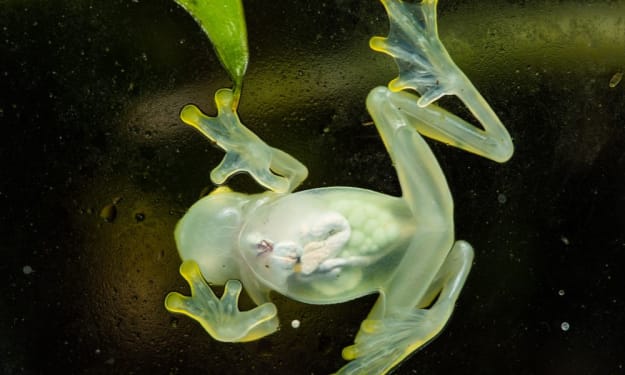The Downs and ups of life with a stubborn Samoyed
so last summer my dog did something cool...

All dog-owners believe they have the best dog in the world, but in my case, it was actually true. Ever since I was an animal-obsessed pre-teen who’d pore over books of different breeds for fun, all I’d wanted in the world was a Samoyed named Bentham. Why Bentham? For the great philosopher behind the theory of ‘utilitarianism’ or the belief in the moral worth of that which yields the greatest good for the greatest number. I figured they were a deeply utilitarian breed. Walk down the street with a magnificent, fluffy, smiling Samoyed at your side, and your journey is guaranteed to take twice as long. They are inherently social, exceptionally loyal and an all-round good doggo.
In the autumn of 2020, my dream finally became a reality. It didn’t matter that we were in the midst of a global pandemic, which had seen the price of puppies from reputable and disreputable breeders’ alike skyrocket. It also didn’t matter that Bentham was a girl and my partner, a traditionalist in the name department, took an instant dislike to most of its diminutive forms. I explained that in Scottish ‘Ben’ meant ‘mountain’ and that’s what she was, a tiny, perfect mountain of fluff with two pointed ears and a pointed snout sticking out from its peak. He was unconvinced. In his eyes ‘Ben’ meant the same conversation with a stranger repeated ad-infinitum: “actually, she’s a girl, my partner just lives in a weird upside-down universe where gendered names are a thing of the past, I suppose it doesn’t really matter if you’re a dog… or maybe it does, anyway, do you come here often?” Otherwise, the three of us along with our almost-ten-year-old rescue cat muddled along quite happily together as we navigated the pitfalls of expectation and reality.
There was just one area in which my otherwise perfect puppy ranged from a little less perfect to a complete holy terror. Like all Samoyeds, Bentham had an independent streak. Her hearing was so selective while walking off-lead that she could hear the word ‘sausage’ half a mile off but ignored her own name when it was hollered from an arm’s-length away (at one point we abandoned name-based recall entirely and passersby were treated to the spectacle of two grown adults marching up the beach shouting “Sausage! Treat! Ice-cream”). She was a sweet-natured dog; eager to please, eager to learn and happy to muck along with whatever you had planned, but once the call of the wild (or even the call of the local recreation ground) took her, the advice of numerous trainers, behaviorists and YouTube videos became useless. We resolved to limit the amount of time she spent off-lead to secure parks or remote hills where there were no roads, no livestock and no large birds she could chase.
Despite our best efforts, we made very little progress with Bentham’s recall for the next six months. Sometimes it seemed perfect, until a squirrel or a crow, or literally any distraction crossed her path. Other times the sight of a flock of pigeons was enough to send me into a cold sweat only for her to ignore them entirely and plod on. It was clear that she relished time spent off-lead and would sleep for hours afterwards, but we were increasingly hesitant to grant her that freedom if there was a chance that she’d turn her ears off the second we did.
When Bentham was ten months old, a roasting hot summer’s day gave me the perfect opportunity to take her on a bit of an adventure. I’d completed the South Downs Way – a scenic hundred-mile stretch of the South Downs National Park – on my own the previous summer, and longed, much of the way, for a dog to share the experience with. I wouldn’t call myself a loner, but in moments like that, when I could enjoy the great outdoors without feeling the need to make it entertaining for someone else, I relished my own company. A dog, however, was the best of both worlds. The bond between our two species – one that had endured for millennia – rarely feels more profound than when the two of you are conquering some barren stretch of hillside together. I had no intention of taking my ten-month-old puppy, who had a double-coat and was pretty lazy in the heat, across the full hundred-mile stretch, but I thought a day-hike would be a great way to introduce her to this vision.
The resulting adventure lacked a lot of that romanticism. We caught a bus to the estuary of the Adur River, and endured a long, sweaty walk up a footpath teeming with cyclists. Freed from her lead, Bentham initially bounded into the long grass, returning only when her coat was thick with burrs, then, for good measure, sprinting down onto the tidal banks of the Adur, returning only when her coat was thick with mud. Samoyeds, on the whole, are not a swimming breed and for most Arctic dogs, finding yourself submerged can mean hypothermia is imminent, so until that day I’d never seen her more than knee-deep. Now, probably because it was roasting hot and she had no means of stripping off that shaggy fur-coat, she dove into the cool brown water and frolicked like a seal. I laughed as she paddled away from a swan which sent a warning hiss in her direction, and for the first time in months the lingering sense of panic that usually accompanied letting her off didn’t materialize.
Her antics had me in stitches by the time we reached the abandoned cement-works on the edge of the national park. She made it clear she didn’t think the coating of mud on her legs and chest made for enough brown and rolled in the dust until she was the color of a used teabag. Then, delighted with her handwork, she ran in small figures of eight before flopping on the ground once more and insisting we take a break.
When she’d snuffled up both her own lunch and the remnants of mine, we were off again, ascending a steep (by South-of-England standards) slope where an epic view of the sea greeted us. Bentham wasn’t the least bit interested in the view. She’d taken to pouncing, like a cat, on things I couldn’t see in the verges beside the fence and when I watched a tiny green cricket spring up from between her front paws, I couldn’t help smiling.
Some of the fields we passed through were occupied, so the lead was quickly slipped back over her head without hesitation. Bentham had always been funny around horses but now, as I watched her drop down to her elbows in front of one, in an unmistakable doggy gesture, I realized why. Though the breed was known for its keen intelligence, my Samoyed genuinely believed that this immense Clydesdale, complete with coarse mane and feathered hooves, was a giant dog and her body-language was an invitation to play.
Away from her enormous friend and once again enjoying the freedom to roam, Bentham chose, instead, to stay close to heel and match my pace. I could tell from the way her great plumed tail hung low that she was getting tired, but we were still at least three miles from our destination; a pub at the top of Devil’s Dyke where my partner would be waiting to pick us up. We rested a while, looking out across the horizon to where we might have seen France if it were just a few miles closer.
As we made our way further along the grassy slopes of the whale-backed downs, Bentham’s gait changed once again. She no longer leapt to and fro in puppyish bounds, nor took the slow, plodding steps of one resenting her owner’s enthusiasm for long hikes. With her toes pointing slightly inward, she kept up an elegant, mincing trot, paws making no sound on the chalky path. There was something ancient about the movement, more wolf than dog, as though she was no longer a stranger to the landscape but had become one with it. Lost in the happy trance of watching her, it caught me entirely by surprise when she froze, ears pricked, then bolted over the hill before us, just as a scream pierced the still, muggy air.
I was bright red and breathing fast by the time I’d sprinted after her, but when I saw what she’d started at, I felt the colour drain from my face. A cyclist was contorted across the path, his left arm pointing in a direction it probably shouldn’t have been. Bentham ran to lick his torn elbow, but he grimaced and let out another strangled yell, his face even whiter than mine. The number one rule of first-aid training had always been don’t move someone who might have a spinal injury, which was all well and good until you asked yourself what the hell you were supposed to do with them. I fumbled for my phone, but the reception was playing up and I had no service what-so-ever. The cyclist pointed shakily at a phone-shaped pouch on the back of his saddle, but as luck would have it, we were both on the same crappy provider. Just when I thought things couldn’t get any worse, Bentham shot forwards again, getting smaller and smaller until she was almost a white smudge at the top of the next hill.
“Bentham! Get back here!” I shouted crossly, but it was no use, she’d never been one for listening before, why should now be any different? Then something extraordinary happened.
Tilting her neat black lips to the sky, the little Samoyed closed her eyes, threw back her head and howled. It was one of the most beautiful sounds I’d ever heard, mournful but melodic at the same time and loud, loud enough to carry right across the fields until the whole of the South Downs seemed to ring with it. She carried on for some time, until the sound faltered in her throat and that’s when they appeared.
People materialized, first in twos and threes then as one great mass, over the hill, breaking into a run when they saw what had happened. They formed a protective ring around the cyclist until someone from somesuch walking group turned out to be an off-duty paramedic.
I never found out the name of the cyclist, or whether his arm took long to heal. When you’re thoroughly useless in high-risk medical situations, knowing to get out of the way and let those who know what they’re doing handle it can be an asset rather than a source of shame. We’d all been lucky in that the Dyke pub was within view of the hill beneath which the bike had lost its grip, so it wasn’t only seasoned walkers but day-trippers, families and several tourists who’d heard Bentham’s summons.
For a while after we arrived, all we could do was sit on the grass staring out at nothing in particular. I wasn’t just shaken from what I’d seen, I couldn’t stop wondering what would have happened if it had been me, writhing in agony on the path with no-one around to sound the alarm. I’d been so focused on the risks attached to letting Bentham run free, it had never occurred to me there might be moments when it wasn’t only important but essential. For the first time, her fiercely independent nature and stubborn refusal to obey orders had actually helped somebody.
For the most part, she seemed completely unaware of her act of heroism. She was far more interested in the ice-cream van parked up beside the pub. She flashed me her most appealing smile, tongue lolling out from one side, and still squinting in the evening sunshine. I soon relented.
My partner pulled in just as the two of us were slurping ice-lollies in the carpark and when he greeted us with a terrified “There’s blood on your shirt!” I finally got to fulfil every horror-movie nerd’s fantasy and announce nonchalantly
“It’s not mine.” Before climbing into the passengers’ side.
Bentham fell asleep sitting up as I recounted our adventures on the journey home. I didn’t take it personally. In fact, she slept right through to the following morning when I practically had to roll her off me, so that I could get up for work.
Dogs’ lives are neither lengthy nor logical, and we seem to spend a lot of them on high alert that something can and will go wrong. I suppose living in a seaside town with a selectively deaf Samoyed who loves ice-cream more than anything probably makes that need for alertness even more acute, but Bentham taught me a valuable lesson that day. Was it that I needed to place more trust in her, in her ancient instincts and wily intelligence? That I should let her guide me every once in a while? Pfft. No. I mean, she still goes nuts every time she spots a squirrel, even when there’s a road between the squirrel and her. What I learned was that all dog owners believe they have the best dog in the world, but in my case, it was actually true.
About the Creator
Ingrid Allan
I'm a 26 year-old freelancer who has been writing fiction in her spare time since I was 13. I've published a fair few articles, mostly in practical fishkeeping and am always looking to expand my range. Commissions welcome.
Enjoyed the story? Support the Creator.
Subscribe for free to receive all their stories in your feed. You could also pledge your support or give them a one-off tip, letting them know you appreciate their work.






Comments
There are no comments for this story
Be the first to respond and start the conversation.